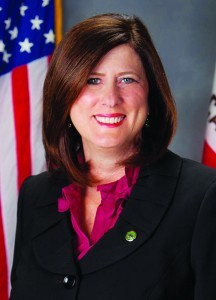California political leaders have become remarkably bipartisan in their support for new laws to regulate cannabis. Bringing the product into the sunshine after decades in the shadows is not controversial, at least in the halls of the state capitol.
Voters’ support may be another story. While polling shows a slight majority of Californians favor freeing cannabis from its medicinal boundaries and allowing the product to be sold to adults without a doctor’s recommendation, cannabis promoters can’t take the public’s approval for granted. The margins are too thin, especially when it comes to taxing. The June primary election in the city of Sacramento provided a cautionary tale for the industry.
A veteran Sacramento City Council member, Jay Schenirer, proposed a 5-percent business tax on commercial cultivation in the city, with the revenue designated for youth services. The tax was specific to indoor grows, because outdoor cultivation has not been legalized within Sacramento city limits.
The city of Sacramento is a progressive place where Democrats have ruled for decades. Only one Republican has been elected to the city council in the past quarter-century, and he was voted out of office six years ago. Regardless, the feel-good ballot measure engineered by Schenirer and a majority of council members failed at the ballot box, falling just short of the 66.6 percent majority needed for passage.
Specific tax initiatives in California must win by a two-thirds majority. That’s a high hurdle. But Sacramento’s liberal traditions and the revenue benefits for young people might reasonably have been enough to succeed. The final count put the tax proposal, called Measure Y, at just over 65 percent, not enough for passage.
“I think 65 percent of the people saying we think that this is an important thing to do is a good start,” Schenirer said, trying to put a positive spin on the defeat. Nevertheless, there was a lesson in the vote count: Although popular among voters in the city’s centralized precincts, but support fell off sharply in suburban neighborhoods. The suburbs killed the cannabis tax.
As California gears up for an adult-use ballot measure in November, the battleground will be the suburbs, which tend to be more conservative. Adult-use approval needs a simple majority, 50.1 percent, but supporters are advised to assume battle positions and fight for every vote.
People’s choice: During the June primary, Sacramento political insiders kept close watch on a rural area that normally gets little attention—Nevada County, home to one of the state’s most robust cultivation cultures.
A conservative board of supervisors controls Nevada County. In January, on the first read, those supervisors passed an ironclad outdoor cultivation ban. They didn’t publish their intentions first and return to the next meeting for a final vote, which is standard practice for elected boards in California.
Sheriff Keith Royal drew up the Nevada County ban and then tried to avoid public review for his “emergency” proposal by keeping it hidden until the last moment. When the ban was jammed through, a capacity audience at the supervisors meeting howled. As appeasement, the supervisors agreed to place a non-binding affirmation of the cultivation ban on the June ballot, claiming they would respect the voters’ will.
Little did the Nevada County supervisors realize voters would take them up on the offer. When the June votes were counted, the sheriff’s ban lay in ruins, defeated by 58 percent. “In January, I probably would have had a difficult time believing this outcome was possible,” said Hezekiah Allen, executive director for the California Growers Association.
Nevada County supervisors clearly didn’t anticipate having to make good on their promise to rescind the cultivation ban. They locked out the media from the first post-election meeting with cannabis stakeholders.

As cannabis elections go, the Nevada County outcome may be transformative.
Word play: The State Senate approved a controversial bill by Mike McGuire (D-Healdsburg) to tax retail cannabis sales at 15 percent. Before Senate Bill 987 passed 27-10, every mention of the word “tax” was replaced by the word “fee.” The 15-percent imposition was reduced to 10-percent.
In contrast, cannabis flowers, leaves, and immature plants will be taxed at the wholesale distribution level under Assembly Bill 2243, authored by Jim Wood (D-Healdsburg). The proposal was unanimously approved by the Assembly and moved to the Senate, where it awaits a hearing. The Board of Equalization would collect the tax, which ranges from $1.25 per immature plant to $9.25 per ounce for flowers.
Cottage progress: An important adjustment to last year’s California Medical Marijuana Regulation and Safety Act has passed the Assembly and appears destined for adoption by the Senate.
AB 2516, authored by Wood, would add a new cultivation license category for “specialty cottage industry” growers, Type 1C. The “speciality cottage” category was overlooked in legislation signed by Governor Jerry Brown in October 2015. Wood’s bill sailed through the Assembly 63-9.
In cash we trust: Payments for taxes, fees, and fines will become a little easier if of AB 2149, carried by Susan Bonilla (D-Concord), passes. The bill allows the State Board of Equalization to accept cash payments from cannabis-related businesses on behalf of other state agencies, including Consumer Affairs, Food and Agriculture, Public Health, Employment Development, Water Resources, and Franchise Tax.
AB 2149, which moved on to the Senate with a 57-22 vote, deploys the Board of Equalization as a one-stop shop for fees, fines, and taxes paid in cash by the cannabis industry. It doesn’t resolve the banking problem, but centralizes and somewhat mitigates the payment hassle.
We say cannabis: Among the wave of cannabis-related legislation that passed from the Assembly into the Senate in June was AB 1575, introduced by Rob Bonta (D-Oakland). The bill would repair errors in last year’s comprehensive regulation package.
Key among the cleanup effort is the law’s name. The Bonta bill would change the Medical Marijuana Regulation and Safety Act to the Medical Cannabis Regulation and Safety Act, and would rename the state’s licensing bureau the Bureau of Medical Cannabis Regulation. The bill passed the Assembly with a 65-8 vote. State Representative Susan Bonilla also has proposed a cannabis name-change bill, AB 2672. Finally, the word “cannabis” is fashionable in Sacramento.
R.E. Graswich is a veteran author, journalist, broadcaster, and communications consultant. He has written extensively about state and local politics in California.










